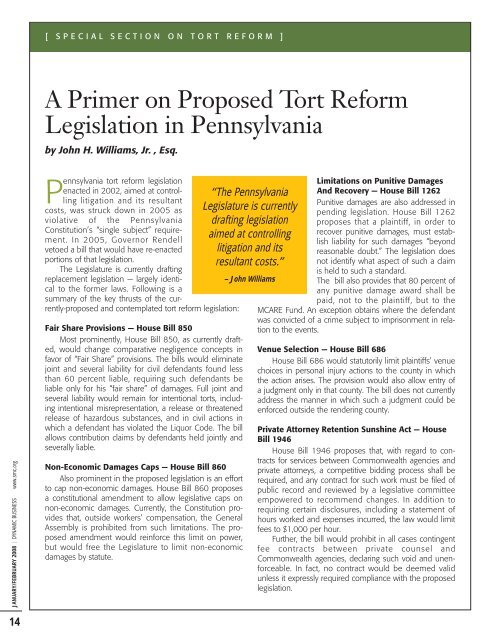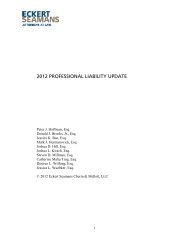Dynamic Business Jan/Feb Edition 2008 - Eckert Seamans
Dynamic Business Jan/Feb Edition 2008 - Eckert Seamans
Dynamic Business Jan/Feb Edition 2008 - Eckert Seamans
Create successful ePaper yourself
Turn your PDF publications into a flip-book with our unique Google optimized e-Paper software.
[ SPECIAL SECTION ON TORT REFORM ]<br />
A Primer on Proposed Tort Reform<br />
Legislation in Pennsylvania<br />
by John H. Williams, Jr. , Esq.<br />
JANUARY/FEBRUARY <strong>2008</strong> | DYNAMIC BUSINESS www.smc.org<br />
Pennsylvania tort reform legislation<br />
enacted in 2002, aimed at controlling<br />
litigation and its resultant<br />
costs, was struck down in 2005 as<br />
violative of the Pennsylvania<br />
Constitution’s “single subject” requirement.<br />
In 2005, Governor Rendell<br />
vetoed a bill that would have re-enacted<br />
portions of that legislation.<br />
The Legislature is currently drafting<br />
replacement legislation — largely identical<br />
to the former laws. Following is a<br />
summary of the key thrusts of the currently-proposed<br />
and contemplated tort reform legislation:<br />
Fair Share Provisions — House Bill 850<br />
Most prominently, House Bill 850, as currently drafted,<br />
would change comparative negligence concepts in<br />
favor of “Fair Share” provisions. The bills would eliminate<br />
joint and several liability for civil defendants found less<br />
than 60 percent liable, requiring such defendants be<br />
liable only for his “fair share” of damages. Full joint and<br />
several liability would remain for intentional torts, including<br />
intentional misrepresentation, a release or threatened<br />
release of hazardous substances, and in civil actions in<br />
which a defendant has violated the Liquor Code. The bill<br />
allows contribution claims by defendants held jointly and<br />
severally liable.<br />
Non-Economic Damages Caps — House Bill 860<br />
Also prominent in the proposed legislation is an effort<br />
to cap non-economic damages. House Bill 860 proposes<br />
a constitutional amendment to allow legislative caps on<br />
non-economic damages. Currently, the Constitution provides<br />
that, outside workers’ compensation, the General<br />
Assembly is prohibited from such limitations. The proposed<br />
amendment would reinforce this limit on power,<br />
but would free the Legislature to limit non-economic<br />
damages by statute.<br />
“The Pennsylvania<br />
Legislature is currently<br />
drafting legislation<br />
aimed at controlling<br />
litigation and its<br />
resultant costs.”<br />
– John Williams<br />
Limitations on Punitive Damages<br />
And Recovery — House Bill 1262<br />
Punitive damages are also addressed in<br />
pending legislation. House Bill 1262<br />
proposes that a plaintiff, in order to<br />
recover punitive damages, must establish<br />
liability for such damages “beyond<br />
reasonable doubt.” The legislation does<br />
not identify what aspect of such a claim<br />
is held to such a standard.<br />
The bill also provides that 80 percent of<br />
any punitive damage award shall be<br />
paid, not to the plaintiff, but to the<br />
MCARE Fund. An exception obtains where the defendant<br />
was convicted of a crime subject to imprisonment in relation<br />
to the events.<br />
Venue Selection — House Bill 686<br />
House Bill 686 would statutorily limit plaintiffs’ venue<br />
choices in personal injury actions to the county in which<br />
the action arises. The provision would also allow entry of<br />
a judgment only in that county. The bill does not currently<br />
address the manner in which such a judgment could be<br />
enforced outside the rendering county.<br />
Private Attorney Retention Sunshine Act — House<br />
Bill 1946<br />
House Bill 1946 proposes that, with regard to contracts<br />
for services between Commonwealth agencies and<br />
private attorneys, a competitive bidding process shall be<br />
required, and any contract for such work must be filed of<br />
public record and reviewed by a legislative committee<br />
empowered to recommend changes. In addition to<br />
requiring certain disclosures, including a statement of<br />
hours worked and expenses incurred, the law would limit<br />
fees to $1,000 per hour.<br />
Further, the bill would prohibit in all cases contingent<br />
fee contracts between private counsel and<br />
Commonwealth agencies, declaring such void and unenforceable.<br />
In fact, no contract would be deemed valid<br />
unless it expressly required compliance with the proposed<br />
legislation.<br />
14
Statute of Repose — House Bill 1005<br />
A recent bill also proposes a statute of repose on<br />
older products. House bill 1005 creates a statute of<br />
repose of 15 years following delivery of the product to<br />
the original owner on product claims. In the event the<br />
product is repaired or modified, the limitation would<br />
begin anew as of the date of the modification, but for that<br />
modification alone.<br />
An exception exists, apparently to accommodate toxic<br />
torts, which exempts “illness” which did not arise within<br />
15 years after first exposure.<br />
Other Proposals Under Consideration<br />
Two measures have been proposed which, if passed in<br />
their current form, would limit certain attorneys’ fees. House<br />
Bill 1941 would amend the Pennsylvania Constitution to<br />
allow the General Assembly to establish limits on attorney<br />
fees in liability cases. Companion House Bill 1942 would<br />
statutorily establish such limitations, in the form of a progressive<br />
cap on fees in such cases.<br />
One proposal, House Bill 470, would restrict liability<br />
with respect to “innocent sellers,” and provide certain protections<br />
to distributors of products where the product has<br />
been misused.<br />
Other proposed legislation would allow defendants to<br />
reveal that a plaintiff has recovered from a “collateral<br />
source.” House Bill 1943 would precludes claimants in<br />
liability actions from recovering for past medical expenses<br />
and lost earnings up to trial if such loss is covered by a<br />
private or public benefit or gratuity. The proposed legislation<br />
also correspondingly eliminates the right of subrogation.<br />
Finally, House Bill 1945 would preclude admissibility<br />
of a “benevolent gesture” or admission of fault by a<br />
health care provider regarding a patient’s discomfort, pain,<br />
suffering, injury or death resulting from treatment, so long<br />
as such “evidence of liability” was made before commencement<br />
of any medical professional liability action.<br />
▼<br />
Editor’s Note: John H. Williams, Jr. is a member in <strong>Eckert</strong> <strong>Seamans</strong>’ Litigation and<br />
Appellate Practice Groups in Pittsburgh. He focuses his practice on Insurance<br />
Coverage Law, Mass Tort and Class Action Law, Product Liability, and Contracts, as<br />
well as Appellate Practice in many areas of law. He can be reached via phone<br />
(412.566.2037) or e-mail: jwilliams@eckertseamans.com.









